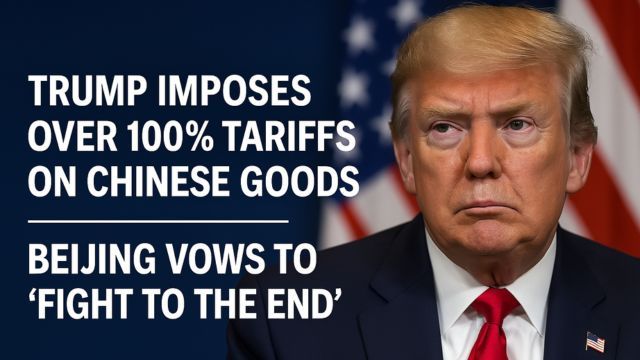Share
Homepage
News
Trump Raises Tariffs on Chinese Goods Above 100% — Beijing Issues Stern Response
Trump Raises Tariffs on Chinese Goods Above 100% — Beijing Issues Stern Response
09 tháng 4 2025
In a major escalation of trade tensions, former U.S. President Donald Trump announced sweeping new tariffs on Chinese imports, raising some rates to over 100%. This dramatic move is part of Trump’s renewed push for “economic fairness” and “reciprocal trade,” as he seeks to spotlight trade imbalances ahead of the 2024 U.S. elections.
Massive Tariff Hike Targets Chinese EVs and Tech
Among the most affected sectors are Chinese electric vehicles (EVs), batteries, and high-tech components, which will now face tariffs of 100% or more. According to the Trump campaign, the move aims to counter what it calls “decades of unfair subsidies” by the Chinese government and to protect U.S. industries from being “decimated by cheap imports.”

Trump emphasized, “We can no longer allow China to take advantage of American workers. These tariffs are long overdue.”
China Responds with Condemnation and Threats of Retaliation
The Chinese Ministry of Commerce quickly issued a statement condemning the U.S. action as “a blatant violation of WTO rules” and warned of “strong countermeasures” if the tariffs are implemented. Chinese officials argued that the tariff hikes threaten to derail fragile global supply chains and undermine the recovery of international trade.
State-run media also accused the U.S. of politicizing trade and engaging in economic bullying.
Global Market Uncertainty Increases
The announcement has injected fresh volatility into global financial markets. Investors are now bracing for a possible trade war resurgence, with stocks of major multinational manufacturers and chipmakers facing pressure.
Economists have warned that retaliatory measures by China could disrupt global technology supply chains, increase prices for consumers, and strain U.S.–China relations further — particularly in sectors like semiconductors, rare earths, and EVs.
What’s Next?
Analysts suggest that China may target American agricultural exports or limit access to critical minerals used in clean energy production. Meanwhile, trade experts are urging restraint, warning that an all-out trade conflict could have wide-reaching consequences for both economies.
As the rhetoric heats up and both sides dig in, global observers are watching closely to see whether diplomatic negotiations can ease tensions — or if the world is on the brink of another trade standoff.
All information on our website is for general reference only, investors need to consider and take responsibility for all their investment actions. Info Finance is not responsible for any actions of investors.